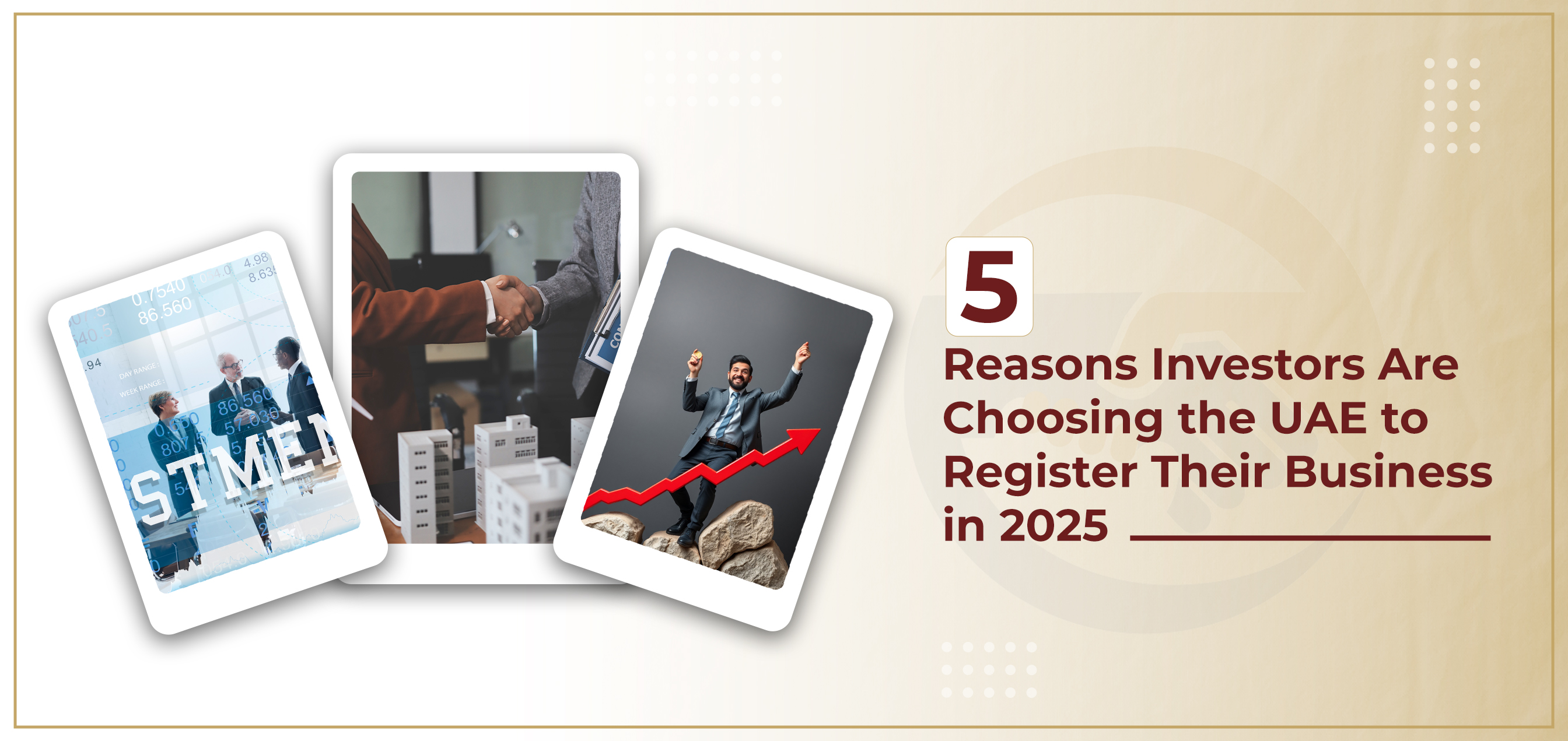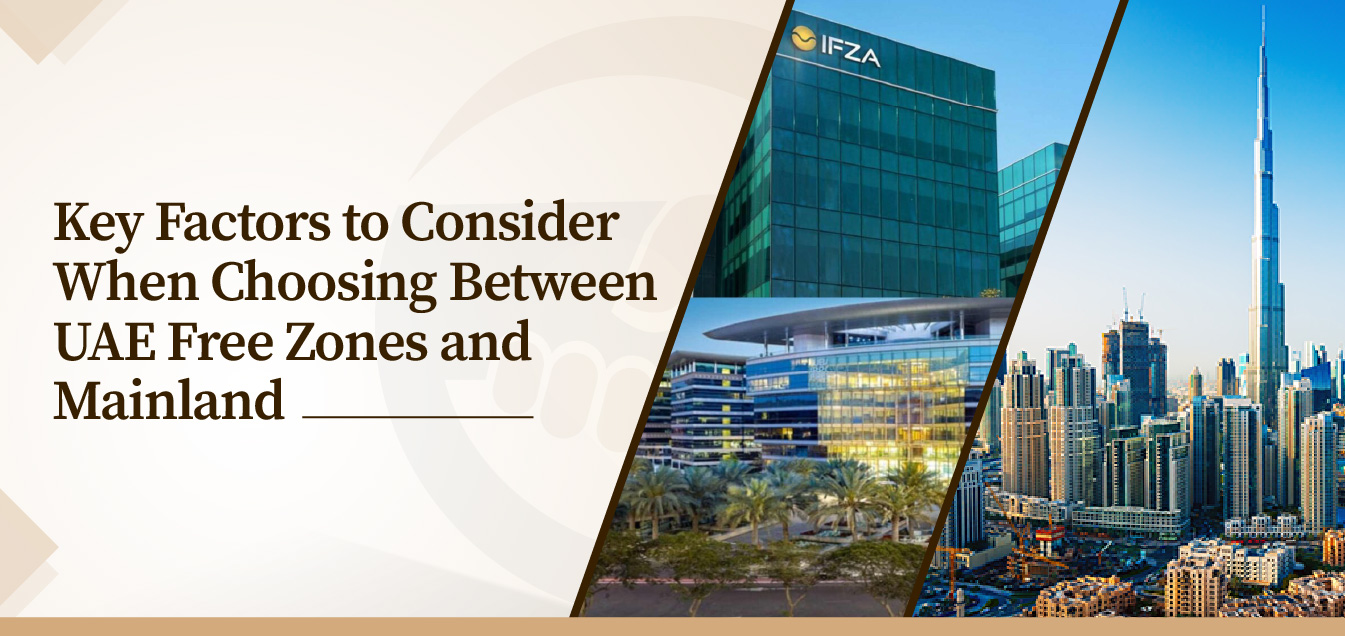Key Factors to Consider When Choosing Between UAE Free Zones and Mainland
Establishing a business in the United Arab Emirates begins with a crucial decision: free zone vs mainland UAE. This choice impacts ownership structure, market access, regulatory responsibilities, and long-term growth. With a variety of UAE business setup options available, understanding the key considerations will empower entrepreneurs to build ventures that align with strategic goals. This blog examines essential factors like licensing, market reach, flexibility, and more to guide your decision-making process.
1. Ownership & Sponsorship
UAE free zone company setup offers 100% foreign ownership, allowing investors full control without needing a local partner—a major draw for international founders.
In contrast, mainland company setup UAE historically required a UAE national sponsor, but recent reforms now enable 100% foreign ownership for many sectors, with some still requiring local participation.
2. Market Access & Business Scope
A core division between Dubai mainland vs free zone setups is their market reach. Free zone business setup Dubai restricts operation within free zones and overseas markets. To engage mainland clients, a local distributor or separate license is needed .
In contrast, mainland company setup UAE allows unrestricted operation across the UAE, direct service to local customers, and eligibility for government contracts—a critical advantage for consumer-oriented or infrastructure-focused enterprises.
3. Licensing & Regulation
The free zone vs mainland UAE comparison shows significant differences in administrative oversight:
-
Free zone licensing is managed by individual Free Zone Authorities, known for streamlined and efficient processes.
-
Mainland licensing falls under the Department of Economy & Tourism, with multi-step procedures involving additional approvals where relevant.
4. Cost Considerations
Although specific values are not highlighted here, it’s essential to note:
- Free zone business setup Dubai typically involves bundled packages with licensing, office, and visa services, often simpler and more predictable.
- Mainland company setup UAE generally involves more complex and variable expenses—covering licensing, office leasing, visa fees, and potential sponsor arrangements.
5. Tax Regime & Duty Benefits
Tax structure varies markedly between the options. While both mainland and free zones comply with corporate tax rules, UAE free zone company setup often offers preferential tax exemptions for qualifying entities.
Mainland entities are subject to the standard corporate tax regime and customs duties, but VAT is applied to both.
6. Visa Allocation & Workforce Flexibility
Visa quotas differ significantly:
-
Free zone visa availability is tied to office capacity and often capped, though authorities offer bundled quotas with licenses.
-
Mainland setup does not impose fixed visa limits; the number of visas scales with real office space, supporting larger teams.
7. Setup Timeline & Administrative Ease
The speed of setup varies:
-
Free zone setups are typically faster due to streamlined processes and single-authority approval structures.
-
Mainland setups may take longer due to government coordination and potential partner arrangements.
8. Industry Fit & Ecosystem Access
Some UAE free zone company setup options are industry-specific—like technology, logistics, or finance—providing specialist infrastructure, networking, and incubator services.
By contrast, mainland permits a broader range of activities and licensing flexibility—ideal for multi-activity businesses and public service providers.
9. Government Tenders & Local Contracts
A notable division: Dubai mainland vs free zone in recruiting public contracts.
Mainland entities can bid directly on tenders and engage in government procurement. Free zone companies cannot access this without a mainland license.
10. Branching & Expansion
Mainland businesses enjoy greater geographic flexibility: branches can be established in different emirates. Free zone entities intending to branch out must set up separate mainland subsidiaries or rely on distributors.

Which Is Better Free Zone or Mainland UAE?
The answer depends on your business model:
-
Choose UAE free zone company setup if your focus is on international trade, fast implementation, and simple visa access.
-
Opt for mainland company setup UAE for unrestricted access to local markets, government project eligibility, and flexibility in expansion and workforce.
Take time to evaluate your needs—things like sector alignment, expected market, number of employees, and long-term strategy.
The decision between free zone vs mainland UAE is strategic. Free zones offer package-driven convenience and ownership control, while mainland setups provide full market penetration and operational freedom. Weighing options like UAE free zone company setup, mainland company setup UAE, and factors such as visa capacity, industry support, and ability to bid for government contracts will guide you to the correct path.
At AMCA, we specialize in UAE business setup options, helping entrepreneurs determine whether free zone business setup Dubai or mainland company setup UAE is most suitable. Are you evaluating which is better free zone or mainland UAE based on your goals? We’ll help assess factors such as ownership, flexibility, growth, and the cost of setting up business in Dubai, and guide you through licensing, visa procedures, and compliance.
Contact AMCA today for a tailored consultation and comprehensive setup plan—so your business launch in the UAE is strategic, smooth, and successful.


.jpg)
.jpg)
